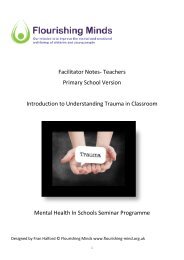Facilitator Notes Understanding Trauma in Classroom Teacher Primary Version final June
Create successful ePaper yourself
Turn your PDF publications into a flip-book with our unique Google optimized e-Paper software.
Introduction to what is <strong>Trauma</strong><br />
• A traumatic experience could be repeated bully<strong>in</strong>g, physical, sexual or emotional abuse, domestic abuse, an<br />
accident, a severe illness requir<strong>in</strong>g medical <strong>in</strong>tervention, live with a parent/s with physical or mental illness,<br />
addiction violence, neglect and experiences of war.<br />
• <strong>Trauma</strong> is often the result of an overwhelm<strong>in</strong>g amount of stress that exceeds one's ability to cope, or <strong>in</strong>tegrate<br />
the emotions <strong>in</strong>volved with that experience.<br />
• the def<strong>in</strong>ition of trauma differs among <strong>in</strong>dividuals by their subjective experiences. People will react to similar<br />
events differently. In other words, not all people who experience a potentially traumatic event will actually<br />
become psychologically traumatized.<br />
• <strong>Trauma</strong> is a direct personal experience of an event that <strong>in</strong>volves actual or threatened death or serious <strong>in</strong>jury;<br />
threat to one's physical <strong>in</strong>tegrity, witness<strong>in</strong>g an event that <strong>in</strong>volves the above experience, learn<strong>in</strong>g about<br />
unexpected or violent death, serious harm or threat of death, or <strong>in</strong>jury experienced by a family member or<br />
close associate.<br />
• Memories associated with trauma are implicit, pre-verbal and cannot be recalled, but can be triggered by<br />
stimuli from the environment.<br />
• The person's response to aversive details of traumatic event <strong>in</strong>volve <strong>in</strong>tense fear, helplessness or horror.<br />
• In children it is manifested as disorganized, agitative behaviours or dissociation ( detachment ) .<br />
What are the contribut<strong>in</strong>g factors that <strong>in</strong>fluence trauma ?<br />
• The young person temperament and unique attributes,<br />
• Previous life events and stressors<br />
• The severity and nature of traumas<br />
• The frequency and duration of trauma’s<br />
• The relationship with the person<br />
• The response of the others around the traumatic event, how is it managed and whether it was believed/<br />
validated<br />
• The sense-mean<strong>in</strong>g-mak<strong>in</strong>g and attributions about the traumas<br />
• The age and stage of the develop<strong>in</strong>g child/young person<br />
• The presence and/or absence of protective factors<br />
• The cultural, gender and contextual relevance of the trauma<br />
3



